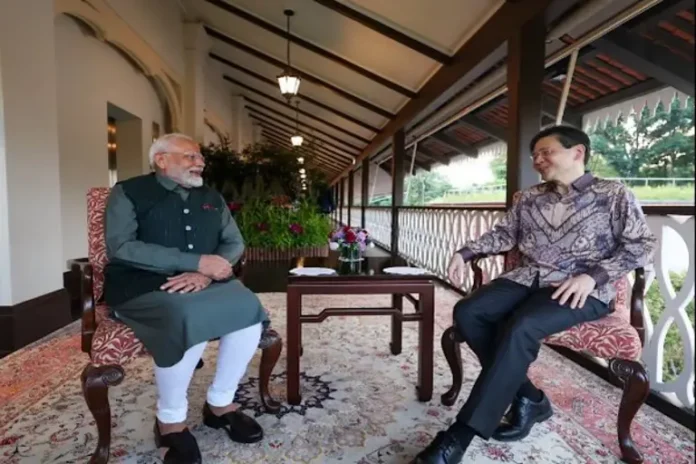Prime Minister Narendra Modi, continuing his diplomatic outreach in Southeast Asia, is set to explore the rapidly evolving semiconductor industry during the second day of his visit to Singapore. The trip is part of India’s ongoing efforts to deepen strategic and economic ties with key international partners and position itself as a global leader in technology and innovation.
Modi’s visit to Singapore comes at a time when the global semiconductor industry is undergoing significant shifts. The pandemic-induced supply chain disruptions, combined with increasing geopolitical tensions, have prompted countries to diversify their semiconductor supply chains. India, with its burgeoning tech industry and a robust manufacturing base, is looking to play a more prominent role in this landscape.
The Importance of Semiconductors
Semiconductors are the backbone of modern technology, powering everything from smartphones and laptops to cars and medical devices. As the world becomes increasingly digitized, the demand for semiconductors is skyrocketing. Global shortages in recent years have underlined the critical importance of having secure and diversified sources of these vital components.
Singapore, a key player in the global semiconductor supply chain, has positioned itself as a hub for semiconductor manufacturing and innovation. Companies in Singapore have developed cutting-edge capabilities, from wafer fabrication and packaging to semiconductor research and development. Modi’s visit to the country, therefore, offers a unique opportunity to foster closer collaboration between Indian and Singaporean companies in this vital sector.
India’s Semiconductor Push
India has been making concerted efforts to develop its semiconductor manufacturing capabilities. The government has launched the ambitious “Semicon India” program, which aims to attract global semiconductor companies to set up manufacturing plants in the country. The program offers incentives, including financial support and land, to lure semiconductor manufacturers to India.
The Indian government’s vision is to make the country a global semiconductor hub, reducing its reliance on imports and boosting its position in the global value chain. As part of this vision, India has been engaging with global players, seeking to forge partnerships and learn from the best in the industry.
Singapore, with its advanced semiconductor infrastructure, is seen as a crucial partner in this effort. Modi’s visit is expected to focus on exploring how India can collaborate with Singaporean companies to advance its own semiconductor ambitions. The two countries already share a strong economic relationship, and the semiconductor sector is likely to become an increasingly important part of this partnership.
A Strategic Partnership
During his second day in Singapore, Modi is expected to meet with executives from some of the world’s leading semiconductor companies, many of which have a strong presence in Singapore. These meetings are likely to focus on potential collaborations, investments, and the sharing of best practices.
Modi’s government has been clear about its intention to turn India into a global technology powerhouse, and semiconductors are a critical component of this strategy. The Prime Minister’s engagement with semiconductor companies in Singapore is a reflection of India’s broader strategy to develop its technology sector and reduce its dependence on foreign imports.
India has already signed several Memoranda of Understanding (MoUs) with other countries and companies in the semiconductor space, and Modi’s visit to Singapore could pave the way for further agreements. These partnerships could help India develop the technical know-how and infrastructure needed to manufacture semiconductors at scale.
Singapore as a Model
Singapore’s success in the semiconductor industry is often seen as a model for other countries. The city-state’s government has invested heavily in education, research, and development, creating a highly skilled workforce and a supportive environment for innovation. In addition, Singapore has established strong international connections, making it an attractive location for global companies looking to tap into the Asian market.
India can learn from Singapore’s experience as it seeks to build its own semiconductor industry. The focus is not just on manufacturing, but also on developing a comprehensive ecosystem that includes research, innovation, and talent development. Modi’s visit will likely include discussions on how India can emulate Singapore’s success, particularly in creating an environment that fosters innovation and attracts investment.
Looking Ahead
As Prime Minister Modi explores the semiconductor innovations in Singapore, the visit underscores the importance of global collaboration in the tech space. The semiconductor industry is highly complex and requires international partnerships to thrive. India’s engagement with Singapore is a testament to the growing recognition that no country can go it alone in this sector.
By fostering closer ties with Singapore, India is positioning itself as a key player in the global semiconductor market. Modi’s visit marks another step in India’s journey towards becoming a global tech leader, with the semiconductor sector playing a pivotal role in this transformation.
India’s growing influence in the semiconductor industry will not only strengthen its economy but also enhance its strategic standing in the world, ensuring a more resilient and diversified global supply chain.
